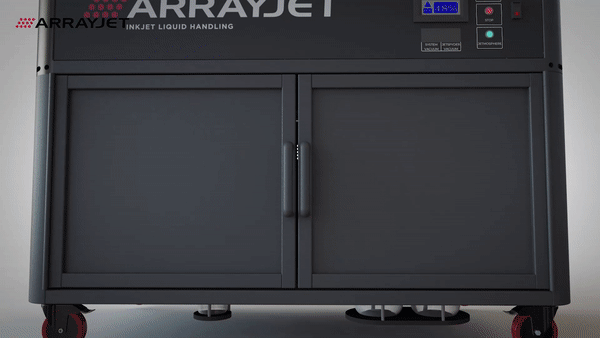Microarrays serve as an impactful tool in life sciences, facilitating high-throughput analysis by allowing simultaneous examination of numerous biological samples. The process of microarray printing involves the precise creation of these microarrays, utilising advanced equipment to lay down an array of biochemical assays with meticulous accuracy.
The primary goal of microarray printing is to systematically organise biological samples into consolidated arrays. While microarrays can be used for gene expression studies, their applications extend beyond this, encompassing a diverse range of microarray types. Arrayjet’s technology is particularly adept at supporting these varied applications, showcasing the multifaceted benefits of microarrays.
Microarrays facilitate high-throughput analysis, allowing researchers to simultaneously study thousands of biological samples efficiently and quickly. The technique is not only cost-effective, using minimal volumes of samples and reagents, but also highly scalable and versatile, catering to various biological assays and research applications.
Microarray printing allows for the creation of arrays that can detect molecules with high accuracy and sensitivity. This technology also supports the simultaneous analysis of multiple samples, ensuring consistent conditions across all interactions. The method supports drug discovery and hypothesis-driven research. Enhanced by technological advancements like non-contact printing, microarray printing ensures reliable and reproducible experimental data, promoting robust research outcomes (e.g. increasing density, flexibility, throughput, and more).
Upholding Rigorous Standards with Technological Progression in Microarray Printing
A pivotal aspect of microarray printing comes from the sophisticated dispensing system, tasked with precisely depositing picolitre-to-nanolitre volumes of samples onto a substrate, commonly a functionalised glass slide, while maintaining accuracy and reproducibility. This technology is central to microarray production, whereby each spot embodies a discrete biological sample, thereby enabling simultaneous analysis of numerous interactions. The dispensing systems often integrate inkjet printing technology. Advanced on-the-fly inkjet printing addresses demands for both high throughput and quality.
Addressing the Challenges: Reproducibility and Manufacturing Throughput in Microarray Printing
Reproducibility is paramount in microarray printing, demanding unwavering consistency and precision in every array. At Arrayjet, our commitment to this standard is embodied in our unique Iris™ optical quality control system. Iris™ is an innovative system that inspects printing fidelity in real-time, harnessing AI software to detect and rectify anomalies instantaneously. Our separate JetMosphere™ system meticulously regulates the printing environment, including critical factors like humidity, to ensure optimal array quality from start to finish. Together, these systems exemplify our dedication to delivering microarrays of the highest reproducibility and quality.
Manufacturing throughput is another critical aspect of the process for large screening operations. Arrayjet’s printers are designed for efficiency and speed. Our technology can dispense up to 32 unique samples simultaneously on-the-fly, achieving a remarkable rate of over 700 unique spots per second. This rapid dispensing, combined with a substantial sample input capacity and extensive slide output capacity, positions Arrayjet at the forefront of high-throughput microarray manufacturing.
Arrayjet’s Dedication to Precision and Robust Microarray Printing Solutions
At Arrayjet, we are firmly committed to precision, consistency, and innovative advancements in microarray printing technology. The capacity of microarray printing to drive scientific discovery is boundless. Our custom microarray solutions are designed to improve and scale screening workflows.
Each printed droplet on a microarray represents a wealth of data with the potential to drive scientific research forward. Arrayjet’s technology is utilised across various sectors, including academia, life sciences, diagnostics, and pharmaceuticals. We remain committed to delivering high-speed microarray printers that consistently produce accurate and reliable results across all types of biological samples.


